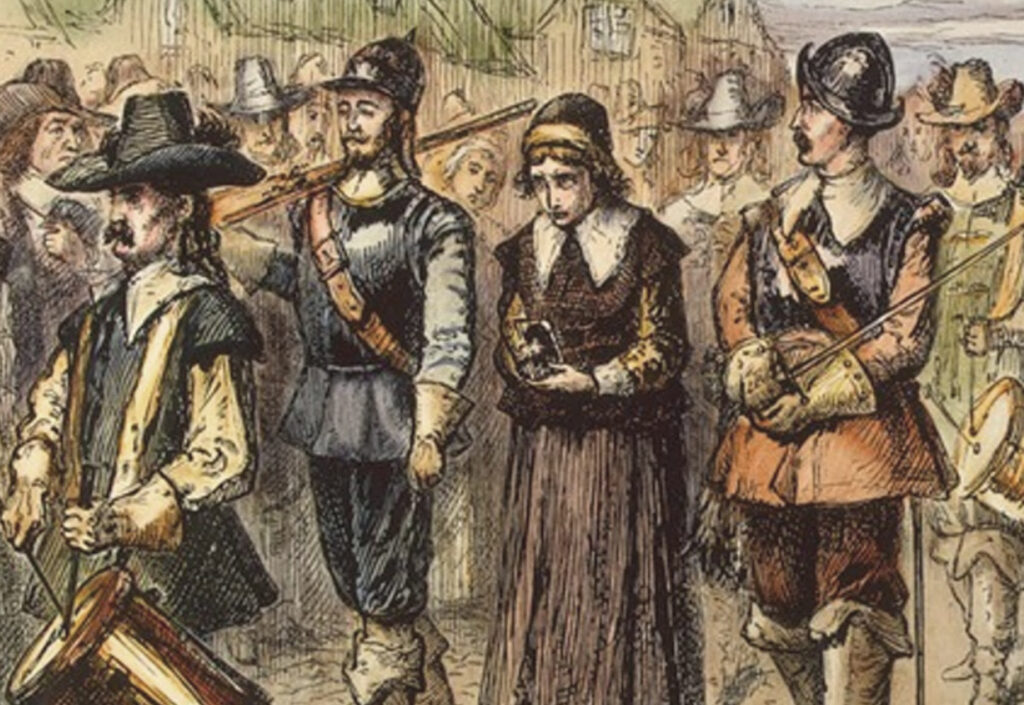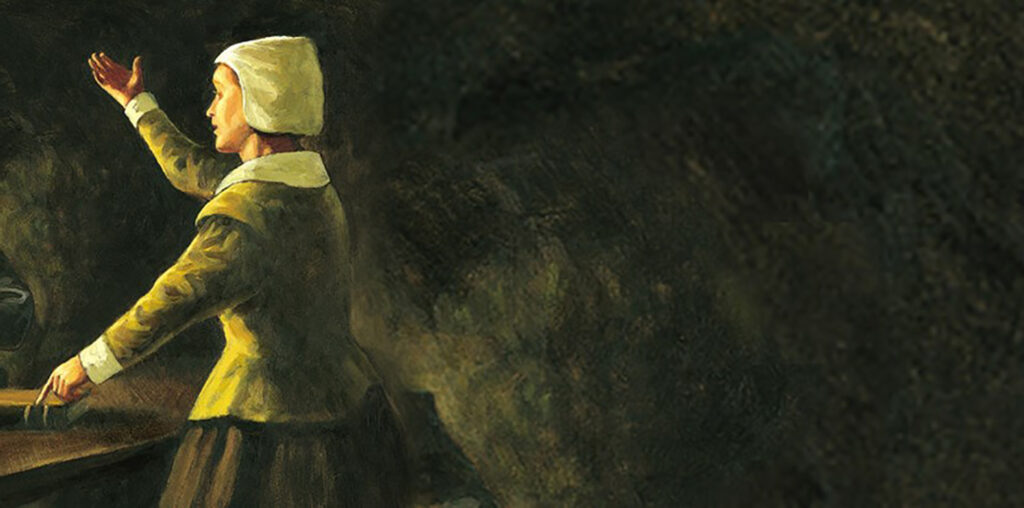Upon arriving in Boston, the wealthy Hutchinson’s built a large home next door to the now governor, John Winthrop. They became close with Lord Henry Vane the Younger (ancestor of Sir Winston Churchill, whose mother was American lest we forget). A member of King Charles’ court, Lord Henry’s father was the King’s Comptroller, or in our modern parlance the King’s CFO.
In 1635, Vane’s religious convictions caused him to flee London incognito on the ship Abigail, which also carried the governor’s son John Winthrop the Younger and family. The Abigail was to land on the Shawmut Peninsula with an outbreak of the smallpox. Foreshadowing, perhaps?

Anyway, Anne quickly resumed her Bible-study meetings, derisively called “conventicles” or secret meetings, once their house was complete. Many of her followers were women, but Lord Vane was a regular. Their neighbor, Governor Winthrop, was impressed by the huge gatherings, but not in a good way. He was also envious of Lord Vane, who Winthrop was convinced was after his job. Maybe Winthrop had the gift of prophecy as well, since he would eventually be Deputy Governor to Governor Henry Vane.
Our friend Rev. Zechariah Symmes had become the pastor of the First Church of Charlestown, and he heard of the goings on at the Hutchinson house through Governor Winthrop’s deputy, Thomas Dudley (9th GGF of President Herbert Hoover). He recounted to Dudley the harrowing trip on the Griffin where it seems the woman Anne Hutchinson had sought to undermine his authority at every turn. She had even threatened him at one point prophesying that “when they came to Boston there would be something more seen” of him.
Heresy hunter Dudley could not wait to report back to the governor. They labeled Anne an Antinomian, from the Greek Anti=against and Nomos=the law, because of her belief that the grace of God came through faith without need of works. Moreover, she was a woman, and women were not allowed to lead congregations, and they felt her conventicles had grown to be just that, a congregation. It was time for a hanging.
They were Puritans of course, so there had to be a trial before they murdered Anne. First she was tried and convicted Civilly in Boston, essentially charged with slander and disturbing the peace, and then she was tried by the presbytery (a church trial). Remember the Puritans firmly believed in the separation of church and state, and yes, I am saying this sarcastically, in case I wasn’t clear.

“They say a man who represents himself has a fool for a client. Well, with God as my witness, I am that fool!” This was not Anne Hutchinson, but Gomez Addams from The Addams Family. Not saying Anne had a choice in the matter. And, no fool, she acquitted herself nicely during the trial. I suppose acquitted isn’t quite the right word. BTW, the transcripts of both trials are available, and I highly recommend their perusal.
Before the trial, Rev. John Cotton, from whom Anne had learned many of the ideas for which she would soon be tried, did his best to diffuse this Antinomian Controversy. He preached a sermon calling for peace and resolution, but found himself being threatened by other ministers that he might soon find himself in Anne’s shoes if he continued.
A loud voice for Anne was her brother-in-law Rev. John Wheelwright. John was married to William Hutchinson’s sister Mary. While John was at college in Cambridge, he became fast friends with another future Puritan leader Oliver Cromwell (commander and confidant of another of my ancestors, but that’s for another post). The infamous reverend Cotton Mather later wrote of Wheelwright that he was known as an excellent wrestler while at university. You get the idea. He was no one to trifle with.
In case you came to this page without reading my previous blog, in my Rhode Island: Marbury ancestor: Sir Walter Blount post, I discuss how the brilliant historian Robert J. Allison made the mistake of saying Anne Hutchinson was the daughter of John Wheelwright in his The Great Courses audiobook entitled “Before 1776: Life In America”, which I still highly recommend despite the flub. But, I digress…
On the same day Rev. Cotton preached his call for a peaceful resolution, our Rev. John gave a sermon in which he excoriated those condemning his sister-in-law, Anne. As had been threatened to John Cotton, Rev. John Wheelwright would now be a part of Anne’s trial, not as a witness, but as a co-conspirator.
Lord Henry Vane, who built an extension onto the Cotton home in which he now lived, had been governor for only a short time when the Antinomian Controversy broke out (remember what I said earlier about foreshadowing?). He defended his friend Anne and found himself deposed by his deputy, Winthrop. Now, Winthrop and Dudley were back in charge and there was little Vane could do for Anne. Frustrated, Vane sailed home to England.
John Wheelwright was then put on trial. He was steadfast in his condemnation of the Puritans of Boston as “antichrists”. Prior to the trial, Henry Vane had circulated a petition to the followers of Wheelwright as a protective measure. The production of this petition was no defense, and Wheelwright was forthwith banished to New Hampshire. Many of the petition signers would be banished soon after.
I realize I have failed to mention, Anne was well-known as a healer, midwife and herbalist, much like Claire Fraser from the “Outlander” series, and like Claire she was well ahead of her time. You see what I did there?
To this day, Anne is known as the “midwife of Harvard”, but not for the reason you would expect. The university was started in “far-away” Cambridge, Massachusetts, then called Newtown, specifically so new ministers could be trained how NOT to fall for the heretical teachings being spread in Boston by the likes of Anne Hutchinson and John Wheelwright. So, the university was founded as a brainwashing machine for the establishment. Thank goodness that has all changed.

Before the trial, Anne let it be known, the only preachers in the colony worth their salt were John Cotton and John Wheelwright. Sadly, during her trial, the cowardly Rev. Cotton did not return the compliment. In fact, to save his hide, he called her conventicles a “promiscuous and filthie coming together of men and women without Distinction of Relation of Marriage”, and he continued, “Your opinions frett like a Gangrene and spread like a Leprosie, and will eate out the very Bowels of Religion.” You have to love the way those Puritans could turn a phrase.
Some of the Puritans may have aspired to hang Anne as a heretic or even a witch, but she had too many devout followers and powerful friends. Additionally, Anne left them with an admonishment that likely had them shaking in their buckled shoes.
Picture Anne pointing a finger at them as she says, “You have power over my body, but the Lord Jesus hath power over my body and soul. And assure yourselves thus much, you do as much in your lies to put the Lord Jesus Christ from you, and if you go on in this course you’ve begun, you will bring a curse upon you and your posterity, and the mouth of the Lord hath spoken it.”
Oh snap! I can just picture these men in black shuffling out, harrumphing to themselves, as one of them mumbles, “Lord above, I’ve pissed me breeks.”
Thus, Anne Hutchinson and her brother-in-law Rev. John Wheelwright found themselves banished from the community they had helped to create. And from there, they walked into the history books.
Just kidding. There’s more.
(To be continued in Anne Marbury Hutchinson Part 3)
Here is a great site for more on the trial of Anne Hutchinson! https://www.famous-trials.com/hutchinson
For an excerpt of the actual trial, follow this link: https://wwnorton.com/college/history/archive/resources/documents/ch02_03.htm